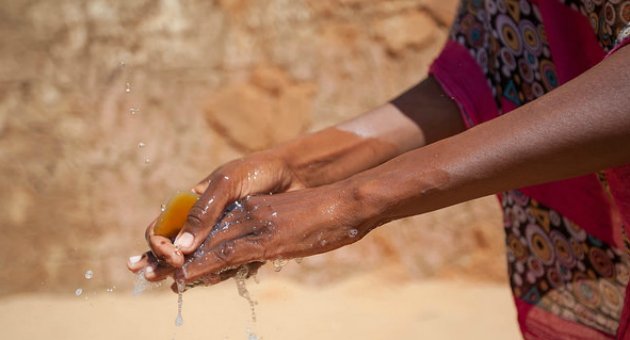Innovations in hand hygiene
14 Oct 2016
Written by Nina Cromeyer Dieke
Every year, 1.7 million children die before reaching five years of age because of diarrhoea and pneumonia, both of which can be prevented with good hygiene and sanitation. In fact, universal adoption of handwashing with soap could save 1 million lives annually. Hand hygiene helps prevent the spread of infection, including resistant bugs like those that cause MRSA, and is one of the most important public health interventions in the world.
Global Handwashing Day, on 15 October every year, aims to increase understanding about handwashing with soap as a way to prevent diseases and save lives.
In helping to stop the spread of germs, including superbugs, handwashing reduces infections and the need for antibiotics in the first place. This simple practice therefore helps conserve our antibiotics for longer.
So how exactly should we be washing our hands?
There are obvious times that call for handwashing, like after using the toilet, before cooking, before eating. For most of us it’s easy enough to find a nearby washroom with running water and soap. During trips, many of us choose to carry antibacterial gels (although the efficiency of these is controversial). When water and soap aren’t an option, WHO recommends rubbing ash or sand on hands.
In her book The Drugs Don’t Work, Dame Sally Davies, England’s Chief Medical Officer, says the ideal way to wash your hands is to rinse them with soap for as long as it takes to sing the Happy Birthday song three times.
Image by UNAMID

Technology for proper handwashing
Companies big and small are creating technology that helps brings accountability to hand hygiene.
Unilever: Smart sensor chips in soap bars that make the soap change colour after it has been used for the appropriate amount of time, informing behaviour
Cloud Clean: Infrared and chip technology to monitor hand hygiene in the food industry, encouraging food handlers to always adhere to hygiene standards
Hospital handwashing: Various companies have developed technologies to improve and monitor hand hygiene in hospitals. 2 million patients contract hospital-acquired infections every year in the United States, and 200,000 of them die. Smart tech, like HyGreen or nGage, monitors when healthcare workers wash their hands or miss opportunities to wash their hands, using sensors to let workers, supervisors, and importantly, patients, know when hand hygiene is good or bad.
Technologies like these can be very expensive, making creating a culture of handwashing all the more crucial to avoid having to recur to costly solutions. But even when awareness and understanding exist, as in healthcare workers, time-constrained schedules and fast-paced demands can sometimes mean basic hygiene procedures are foregone. Outside the hospital, and around the world, access to water and soap can be very limited, requiring much more extensive infrastructural changes.
Innovation prizes for better hand hygiene
Innovation has a big role to play and tackling a crucial issue like handwashing – and the implications of not doing it – requires creativity and multi-sectoral involvement.
Some organisations have used the challenge prize method to encourage solutions:
The Humanitarian Innovation Fund ran a Handwashing Challenge earlier this year to promote hand hygiene in emergency settings.
SCA, a hygiene products company, ran a challenge to find handwashing methods that don’t rely on water and soap.
In 2014, we visited King’s College to investigate which bugs we carry on our hands every day. Someone’s hands revealed E. coli, which would not be there had that person washed their hands after using the toilet!
